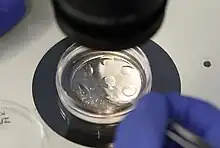
Potassium Simplex Optimized Medium (KSOM) is a specialized medium primarily used for in vitro culture of mouse preimplantation embryos in research.[1][2]
Development
The culture of preimplantation embryos is of paramount importance as it serves as a foundation for exploring embryo development, advancing assisted reproductive technology, and facilitating the generation of genetically modified animals.[1] The primary motivation behind the establishment of KSOM was to address the phenomenon known as the two-cell block, wherein mouse embryos encounter developmental arrest at the two-cell stage.[3] Researchers Lawitts and Biggers, in their groundbreaking work in the early 1990s, employed a sequential simplex optimization strategy to solve this issue.[4] This method involves a systematic approach to optimize multiple variables simultaneously, allowing for the fine-tuning of media components. Their efforts culminated in the formulation of the Simplex Optimized Medium (SOM). Further refinements based on the intracellular K+/Na+ ratio in the two-cell stages led to the evolution of KSOM, potassium-supplemented SOM.[4] Because KSOM uses a bicarbonate buffering mechanism, it is dependent on a CO2 incubator to maintain the right pH. The handling of embryos outside a CO2 incubator necessitates the use of HEPES buffered media, such as M2.[2]
Applications and advancements
Following the foundational success of KSOM, researchers sought to further enhance the mediums' efficacy. This led to the introduction of amino acid supplementation, resulting in the variant known as KSOM/AA. The availability of amino acids in the medium further aided in the development of mouse embryos and augmented their growth potential.[5] KSOM/AA has ever since become the most widely used medium for the culture of preimplantation mouse embryos in research.[2][1] Ready-to-use KSOM/AA can be obtained from various commercial vendors but it can also be prepared in-house based on published protocols.[2]
See also
References
- 1 2 3 Summers, Michael C. (2013-09-18). "A brief history of the development of the KSOM family of media". Journal of Assisted Reproduction and Genetics. 30 (8): 995–999. doi:10.1007/s10815-013-0097-8. ISSN 1058-0468. PMC 3790120. PMID 24046024.
- 1 2 3 4 Behringer, Richard, ed. (2014). Manipulating the mouse embryo: a laboratory manual (4th ed.). Cold Spring Harbor, NY: CSH, Cold Spring Harbor Laboratory Pr. ISBN 978-1-936113-01-9.
- ↑ Goddard, Martin J.; Pratt, Hester P. M. (1983-02-01). "Control of events during early cleavage of the mouse embryo: an analysis of the '2-cell block'". Development. 73 (1): 111–133. doi:10.1242/dev.73.1.111. ISSN 0950-1991.
- 1 2 Biggers, J. D. (1998). "Reflections on the culture of the preimplantation embryo". The International Journal of Developmental Biology. 42 (7): 879–884. ISSN 0214-6282. PMID 9853817.
- ↑ Ho, Yugong; Wigglesworth, Karen; Eppig, John J.; Schultz, Richard M. (1995-06-01). "Preimplantation development of mouse embryos in KSOM: Augmentation by amino acids and analysis of gene expression". Molecular Reproduction and Development. 41 (2): 232–238. doi:10.1002/mrd.1080410214. ISSN 1040-452X. PMID 7654376. S2CID 24036963.